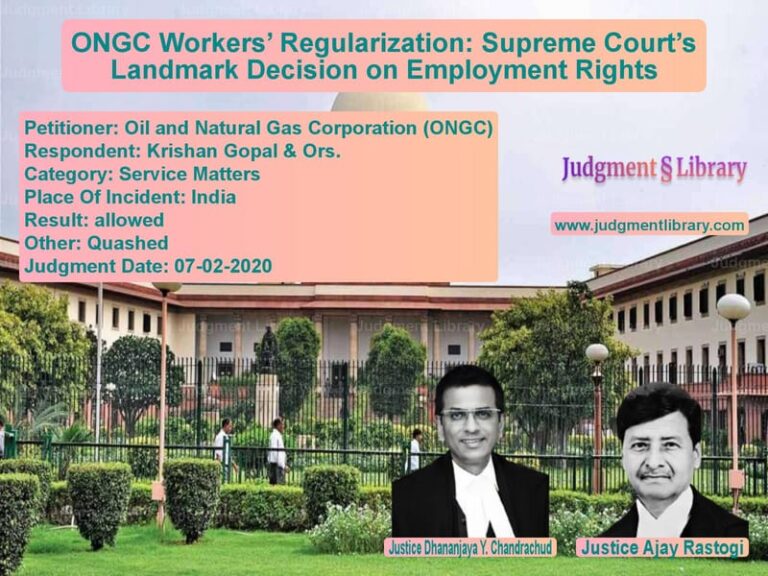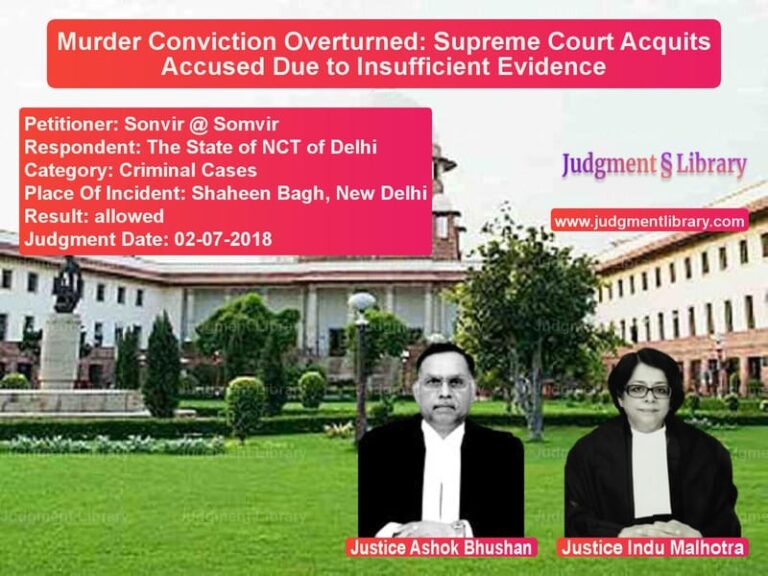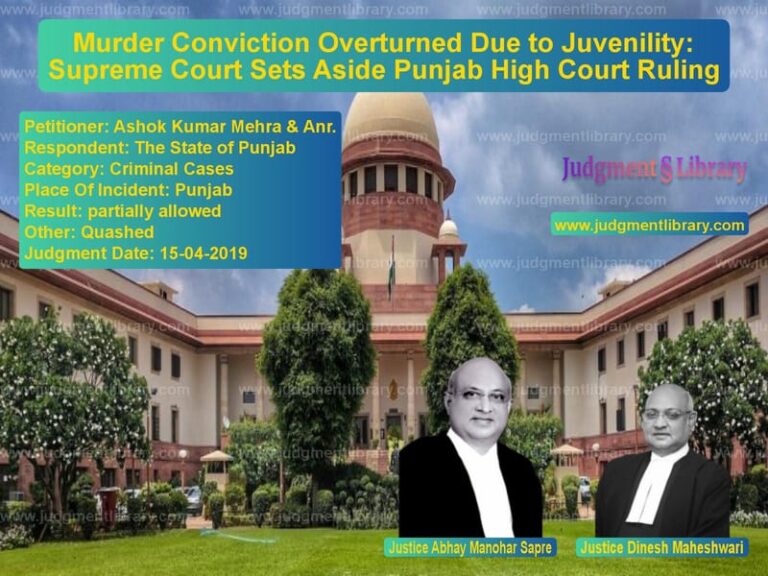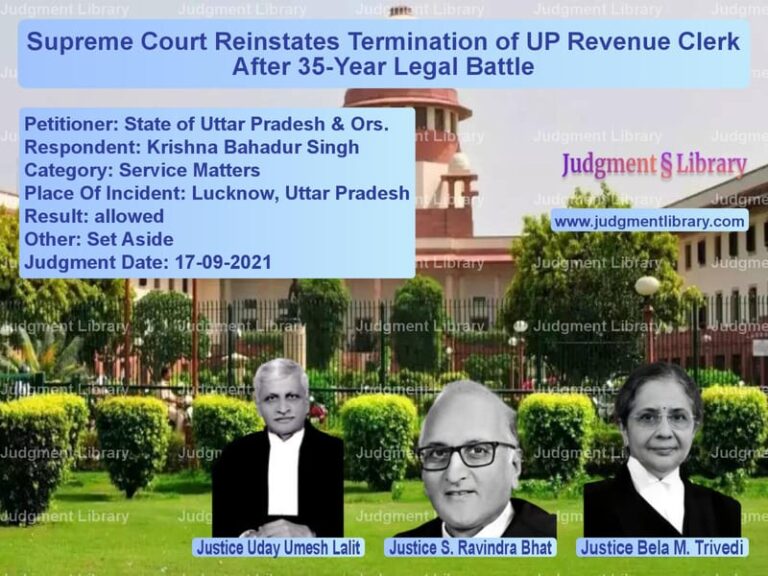Supreme Court Upholds Conviction in Corruption Case Against Sub-Registrar
The Supreme Court of India recently upheld the conviction of a former Sub-Registrar of Cooperative Societies, P. Sarangapani, under the Prevention of Corruption Act, 1988. The case, P. Sarangapani (Dead) Through LR Paka Saroja v. State of Andhra Pradesh, involved allegations of bribery in exchange for allowing the complainant to continue as the President of a cooperative society. The Court reaffirmed that demand and acceptance of illegal gratification can be established through circumstantial evidence, even in the absence of the complainant’s testimony.
Background of the Case
The case arose from an anti-corruption operation conducted on March 27, 1993, where the accused, P. Sarangapani, was caught accepting a bribe of Rs. 1,500. The prosecution alleged that Sarangapani, in his capacity as a Sub-Registrar, demanded and accepted the bribe from the complainant, Immadi Laxmaiah, as a reward for allowing him to continue as the President of a cooperative society. The appellant was convicted by the Trial Court under Sections 7 and 13(1)(d) read with Section 13(2) of the Prevention of Corruption Act, 1988.
The High Court of Andhra Pradesh upheld the conviction and sentence, which included imprisonment for two years and a fine. The appellant subsequently challenged the High Court’s decision before the Supreme Court.
Legal Issues Before the Supreme Court
The Supreme Court examined the following key issues:
- Whether the prosecution had proved the demand and acceptance of the bribe beyond a reasonable doubt.
- Whether the absence of the complainant’s testimony due to his demise was fatal to the case.
- Whether the presumption under Section 20 of the Prevention of Corruption Act was properly applied.
- Whether the appellant’s explanation regarding the receipt of money could rebut the presumption of guilt.
Arguments by the Appellant
The appellant’s counsel contended:
- The complainant, who was the key witness, had passed away before trial, making it impossible to establish the demand for a bribe.
- The money in question was not an illegal bribe but was collected towards audit fees for the society.
- The prosecution failed to prove voluntary acceptance of the bribe.
- Since no direct witness confirmed the demand, the conviction was unsustainable.
Arguments by the Respondent
The prosecution, represented by the State of Andhra Pradesh, argued:
- The demand and acceptance of the bribe were established through circumstantial evidence and independent witnesses.
- The prosecution had presented mediators (panch witnesses) and investigating officers who confirmed the trap operation and recovery of tainted currency.
- Section 20 of the Prevention of Corruption Act permits a presumption of guilt once the acceptance of illegal gratification is established.
- The appellant failed to provide a credible alternative explanation for possessing the tainted money.
Supreme Court’s Analysis
1. Significance of the Complainant’s Testimony
The Court ruled that the complainant’s death before trial did not automatically weaken the prosecution’s case. It cited Neeraj Dutta v. State (Govt. of NCT of Delhi), where the Constitution Bench had held:
“The absence of the complainant does not result in an acquittal, as demand and acceptance can be proved through other evidence.”
Since other witnesses, including panch witnesses and the investigating officer, corroborated the allegations, the Court found no reason to doubt the prosecution’s case.
2. Presumption Under Section 20 of the Prevention of Corruption Act
The Court held that once it is proven that a public servant has accepted money, a presumption arises that the money was accepted as illegal gratification. This presumption can be rebutted by the accused, but the burden lies on him to provide a credible explanation. The Court cited B. Jayaraj v. State of Andhra Pradesh, reiterating:
“If the accused offers a reasonable and probable explanation that the money was not received as a bribe, the benefit of the doubt should be given.”
However, in this case, the appellant’s defense that the money was an audit fee lacked documentary support and was contradicted by the prosecution’s evidence.
3. Corroboration of Demand and Acceptance
The Court examined the testimonies of prosecution witnesses, including:
- PW-2 (panch witness) who was present during the pre-trap and post-trap proceedings.
- PW-5 (Investigating Officer) who confirmed the recovery of tainted money.
- PW-6 (Trap Laying Officer) who supervised the sting operation.
The Court found that the testimonies of these witnesses were consistent and reliable.
4. Failure of the Appellant to Rebut the Presumption
The Court emphasized that under the Prevention of Corruption Act, once the prosecution establishes that money was received by a public servant, the burden shifts to the accused to prove that it was not a bribe. The appellant’s explanation lacked credibility, and the Court found no reason to interfere with the concurrent findings of the lower courts.
Supreme Court’s Judgment
The Supreme Court dismissed the appeal, holding:
“The prosecution has proved beyond reasonable doubt the conscious acceptance of the tainted money. The defense of the accused is not supported by any credible evidence. The appeal is devoid of merit and is accordingly dismissed.”
The Court upheld the conviction and sentence imposed by the Trial Court and the High Court.
Implications of the Judgment
This ruling reinforces several key legal principles:
- Presumption of Corruption: Once a public servant is proven to have accepted money, the burden shifts to him to explain the transaction.
- Independent Witnesses Can Prove Demand: Even if the complainant is unavailable, demand for a bribe can be proven through circumstantial evidence.
- Strict Approach to Public Corruption: The judgment underscores the Court’s commitment to upholding anti-corruption laws.
Conclusion
The Supreme Court’s judgment in P. Sarangapani v. State of Andhra Pradesh is a significant precedent in corruption law. By emphasizing that bribery cases can be established through corroborative evidence and statutory presumptions, the Court has reinforced India’s anti-corruption framework. This ruling serves as a warning to public officials about the strict liability they face under the Prevention of Corruption Act.
Petitioner Name: P. Sarangapani (Through LR Paka Saroja).Respondent Name: State of Andhra Pradesh.Judgment By: Justice Bela M. Trivedi, Justice Dipankar Datta.Place Of Incident: Khammam, Andhra Pradesh.Judgment Date: 21-09-2023.
Don’t miss out on the full details! Download the complete judgment in PDF format below and gain valuable insights instantly!
Download Judgment: p.-sarangapani-(thro-vs-state-of-andhra-prad-supreme-court-of-india-judgment-dated-21-09-2023.pdf
Directly Download Judgment: Directly download this Judgment
See all petitions in Fraud and Forgery
See all petitions in Money Laundering Cases
See all petitions in Judgment by Bela M. Trivedi
See all petitions in Judgment by Dipankar Datta
See all petitions in dismissed
See all petitions in supreme court of India judgments September 2023
See all petitions in 2023 judgments
See all posts in Criminal Cases Category
See all allowed petitions in Criminal Cases Category
See all Dismissed petitions in Criminal Cases Category
See all partially allowed petitions in Criminal Cases Category







